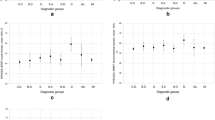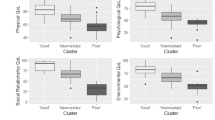Abstract
This study compared the subjective and objective quality of life and needs of patients with paranoid schizophrenia between inner city areas in Berlin (69 patients) and London (75 patients). Quality of life was assessed by means of the Lancashire Quality of Life Profile (German version Berliner Lebensqualitatsprofi), and need was quantified using the Camberwell Assessment of Need (German version Berliner Bedurfnisinventar). The hypotheses tested were that although Berlin patients may rate more highly on objective quality of life measures, the subjective quality of life would be similar as patients would judge their quality of life against their local expectations. The findings supported the first part of the hypothesis as on the objective measures the Berlin group was significantly better off financially and in living conditions, and had significantly fewer material needs. However, despite having more severe psychopathology, the Berlin groups' scores on global subjective quality of life were also higher. On particular life domains, subjective quality of life did not always reflect objective measures and sometimes went in the reverse direction. We concluded that the relationship between subjective and objective quality of life is complex, and great caution must be exercised in making quality of life comparisons between different cultures.
Similar content being viewed by others
References
American Psychiatric Association (1987) DSM-III-R: diagnostic and statistical manual of mental disorders, 3rd edn, revised. American Psychiatric Association, Washington, DC
Bowling A (1991) Measuring health: a review of quality of life measurement scales. Open University Press, Milton Keynes
Brewin CR, Wing J (1993) The MRC Needs for Care Assessment: progress and controversies. Psychol Med 23: 838–841
Brugha TS, Wing KJ, Brewin CR, MacCarthy B, Mangen S, Lesague A, Mumford J (1988) The problems of people in long-term psychiatric day care. Psychol Med 18: 443–456
Gruyters T, Priebe S (1994) Users' assessment of psychiatric treatment—results and problems of a systematic examination (in German). Psychiatr Prax 21: 88–95
Heinze M, Priebe S (1995) The concept of need in psychiatric research (in German). Fundam Psychiatr 9: 52–60
Muijen M, Marks I, Connolly J, Audini B (1992) Home based care and standard hospital care for patients with severe mental illness: a randomised controlled trial. BMJ 34: 749–754
Oliver JPJ (1991) The social care directive: development of a quality of life profile for use in community services for the mentally ill. Soc Work Soc Sci Rev 3: 5–45
Overall JE, Gorham DR (1988) The Brief Psychiatric Rating Scales (BPRS) — recent developments in ascertainment and scaling. Psychopharmacol Bull 24: 97–99
Phelan M, Slade M, Thornicroft G, Dunn G, Holloway F, Wykes T, Strathdee G, Loftus L, McCrone P, Hayward P (1995) The Camberwell Assessment of Need (CAN): the validity and reliability of an instrument to assess the needs of people with severe mental illness. Br J Psychiatry 167: 589–595
Priebe S, Gruyters T, Heinze M, Hoffmann Cm, Jäkel A (1995) Subjective criteria for evaluation of psychiatric care — methods for assessment in research and routine care (in German). Psychiatr Prax 22: 140–144
Priebe S, Gruyters T (1993) The role of the helping alliance in psychiatric community care—a prospective study. J Nerv Ment Dis 181: 552–557
Priebe S, Gruyters T (1995) Patients' assessment of treatment predicting outcome. Schizophr Bull 21: 87–94
Skantze K, Malm U, Dencker SJ, May PRA, Corrigan P (1992) Comparison of quality of life with standard of living in schizophrenic out-patients. Br J Psychiatry 154: 77–82
Steinhart I, Prieve S (1992) Prediction of hospitalisation within a psychiatric community care system — a five year study. Soc Psycgiatry Psychiatr Epidemiol 27: 270–273
World Health Organization (1991) Tenth revision of the International Classification of Diseases (ICD-10)
MacGuffin P, Farmer A, Harvey I (1991) A polydiagnostic application of operational criteria in studies of psychotic illness; development and reliability of the OPCRIT system. Arch Gen Psychiatry 48: 764–770
Author information
Authors and Affiliations
Rights and permissions
About this article
Cite this article
Heinze, M., Taylor, R.E., Priebe, S. et al. The quality of life of patients with paranoid schizophrenia in London and Berlin. Soc Psychiatry Psychiatr Epidemiol 32, 292–297 (1997). https://doi.org/10.1007/BF00789042
Accepted:
Issue Date:
DOI: https://doi.org/10.1007/BF00789042




